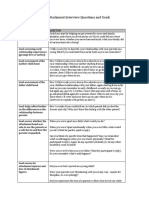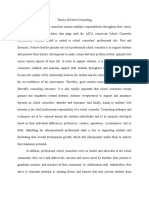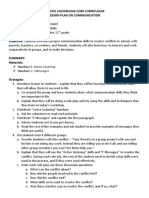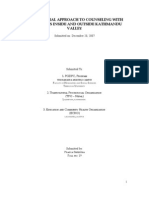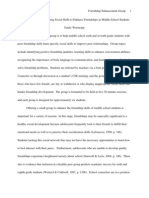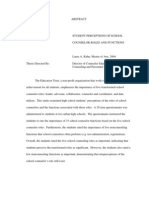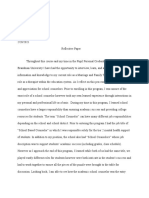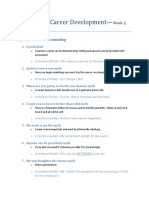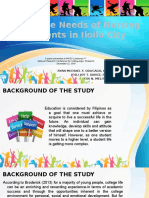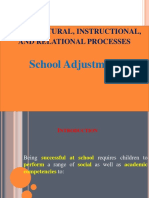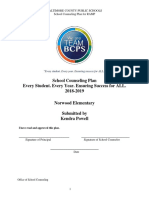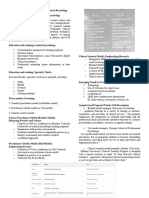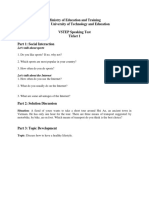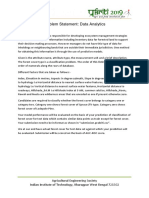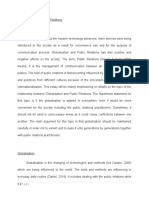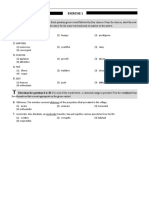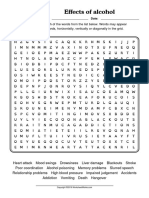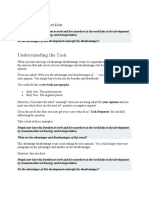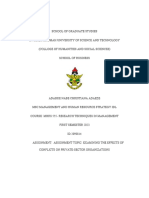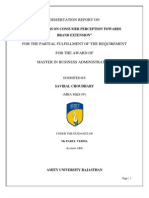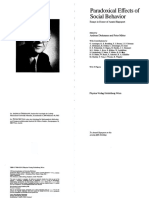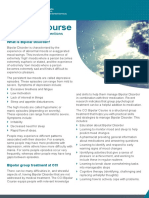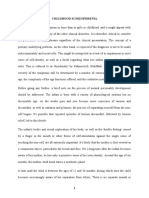Professional Documents
Culture Documents
Comprehensive School Counseling Program
Comprehensive School Counseling Program
Uploaded by
Perry DrippsCopyright
Available Formats
Share this document
Did you find this document useful?
Is this content inappropriate?
Report this DocumentCopyright:
Available Formats
Comprehensive School Counseling Program
Comprehensive School Counseling Program
Uploaded by
Perry DrippsCopyright:
Available Formats
THE
WEST TISBURY SCHOOL COUNSELING PROGRAM A Comprehensive Model For Change Perry Dripps
WEST TISBURY SCHOOL COUNSELING PROGRAM INTRODUCTION In 2006, ABC news show 20/20 created a news documentary entitled, Stupid In America: How We Cheat Our Kids. The question presented in the
documentary was, Are Americas school systems failing? Responses varied greatly among parents, teachers, students, and school administrators. While students claimed they were learning nothing in their classrooms, teachers remained complacent about their abilities as educators. Results however from statewide standardized achievement tests such as the Massachusetts Comprehensive Assessment System (MCAS) make it clear that schools are failing. The implementation of No Child Left Behind (NCLB) in 2001 made federal funding dependent on student performance. Thus, school systems have become increasingly under pressure to close the achievement gap for a very diverse group of students (Dollarhide & Lemberger, 2006). School counseling programs utilize empirical data and evidence based programs in order to help students overcome barriers that affect learning. Race, poverty, and low parental involvement (Lee & Bowen, 2006), along with poor physical health (Efrat, 2011), are just a few of the many barriers that lead students to poor academic outcomes. School counselors are working in collaboration with teachers, administrators, and members of their surrounding communities to address these issues. School environments have also become more violent (Song & Stoiber, 2008). Research identifies a lack of accountability in addressing this, which poses a clear threat to students social and emotional development (Reinke et al., 2011). With the
WEST TISBURY SCHOOL COUNSELING PROGRAM rise of digital media, technology, and the ever-expanding breadth of information available, students must also navigate an increasingly complex, and often violent, environment (Byrne, 2009). Fortunately, many barriers can be overcome with the help of a comprehensive coordinated school counseling program.
The following is a framework for the school counseling program at The West Tisbury School, a rural public K-8 institution in Massachusetts. West Tisbury School requires systemic changes to address issues in achievement, school bullying, obesity, and the media literacy issues aforementioned. THE COMPREHENSIVE COORDINATED SCHOOL COUNSELING PROGRAM Schmidt defines the comprehensive and coordinated school counseling program as, An orchestrated program of responsive services and activities that compliment the instructional program of the school (Schmidt, 2008, p. 55). These programs address student development in three domains: educational, career, and personal/social. By creating a program that is developmental in theory and preventative in practice, school counselors can lead students in becoming successful contributors to society. In the past, restructuring school programs has been carried out in a two- component (Instructional and Management) model (Adelman & Taylor, 2002). This framework addressed various ways to improve student learning, but school counselors largely managed programs with a disjointed array of services that were not properly accounted for (Adelman & Taylor, 2002). In their recent model, Adelman and Taylor (2002) have added a third Enabling component. Enabling utilizes an interconnected continuum of school and community resources to help
WEST TISBURY SCHOOL COUNSELING PROGRAM students overcome a variety of barriers, which has been done in response to NCLB (Adelman & Taylor, 2002). These resources vary in need and cost for individual students and can be categorized in the following three interconnected systems.
These are 1) Systems for positive development and systems of prevention (low end need/low cost programs such as parental involvement), 2) Systems of early intervention (moderate need/moderate cost programs such as providing shelter for students) and 3) Systems of care (high end need/high cost programs such as special education) (Adelman & Taylor, 2002). Programs that utilize all three components (Instructional, Management, and Enabling) help students improve in their educational, career, and personal/social domains. With such a wide range of issues facing schools and their counseling programs, school counselors require a guide to help them strategically implement a curriculum that facilitates student progress. The American School Counseling Association (ASCA) has created a national model that is, Comprehensive in scope, preventative in design and developmental in nature (ACSA, 2005, p. 13). The ASCA model has been created to provide counselors with a reliable framework to help them develop more effective programs. The model is divided into four major systems: Foundation, Delivery, Management, and Accountability. The Foundation describes what students should know and will be able to do with the program (ASCA, 2005, p. 22). This begins with establishing the beliefs and philosophy, which are outlined in an all- encompassing mission statement. The mission establishes a vision for the school to adhere by. These competencies, goals, and skills are then linked with the ASCA
WEST TISBURY SCHOOL COUNSELING PROGRAM National Standards in visual chart called a crosswalk in order to ensure the counseling program addresses the academic, career, and personal/social development needs of all students (Refer to Appendix D).
The Delivery system explains how the implementation process is carried out and is comprised of four main components (ASCA, 2005, p. 39). These are the school guidance curriculum, individual student planning, responsive services, and system support (ASCA 2005, p. 42). The Management system occurs in parallel with the Delivery system and utilizes initial pilot data, collaboration, and consultation to determine how and when specific services will be carried out. Management agreements that outline how the program will be maintained are established and an advisory council is formed to ensure the program is effective. The advisory council ensures the implementation of the program is consistent with the mission and values of the school (ASCA, 2005, p. 47). Finally, the Accountability system outlines, How students are different as a result of the school counseling program (ASCA, 2005, p. 59). School counselors use data in order to ensure the framework is effective and that the services being provided are helping students accomplish the intended goals. The Accountability system also outlines the School Counselor Performance Standards, which ensures the counselor fulfills his expectations and obligations as a professional. Finally, a program audit is used to assess how the current model compares with the ASCA model and areas that require improvement are identified and addressed (ASCA, 2005, p. 66).
WEST TISBURY SCHOOL COUNSELING PROGRAM The following describes the comprehensive and coordinated school counseling program for the West Tisbury School in Massachusetts. The most pertinent needs of the school are outlined here. WEST TISBURY SCHOOL NEEDS ASSESSMENT The West Tisbury School is a small K-8 public school comprised of 320
students in a rural town on the island of Marthas Vineyard. The school day at West Tisbury runs from 7:20AM until 2:20PM and the school employs 40 full-time teachers, 99.4% who are licensed in their teaching assignment, and 100% who are highly qualified (Massachusetts Department of Elementary and Secondary Education Website [MDESE], 2011). 88.4% of students at West Tisbury are Caucasian, 4% Asian, 2.8% Hispanic
or Latino, 5.9% Multi-race (non-Hispanic), 1.9% Native American, and 1.0% Native Hawaiian or Pacific Islander. 1.8% of students have limited English proficiency and 2.2% are English language learners (ELL), which are significantly lower than the state average (refer to Appendix A). There is a 48:52 male to female ratio. 26.4% of students qualify as special needs, which is significantly higher than the state average (Refer to Appendix A). Student socio-economic status varies greatly, with household incomes for a family of four ranging from roughly $22,000 to $300,000+ per year. Student academic performance is high compared to other state public schools. The West Tisbury has met its AYP quota for seven consecutive years and 65-75% of West Tisbury students have scored proficient or higher on the math and verbal sections of the Massachusetts Comprehensive Assessment System (MCAS) over the last two years.
WEST TISBURY SCHOOL COUNSELING PROGRAM A concern however is the gap in achievement scores between special-needs and regular education students. Last year, only 12% of 4th grade special needs students scored proficient or higher on the MCAS verbal whereas almost 65% of regular education students received this same standing. Similar findings were also true in math, with 13% of special-needs students and 75% of regular education students scoring proficient.
The National Assessment of Educational Progress (NAEP) is an achievement test commonly used to help confirm the results of other statewide assessments such as the MCAS (Refer to Appendix B). The results from the 2009 NAEP are consistent with the aforementioned MCAS results. 8th grade students NAEP scores indicate this gap increases during middle school (Refer to Appendix C). This is consistent with findings from current research (Efrat, 2011). Only 9% of 8th grade special needs students scored proficient on last years MCAS verbal section. The West Tisbury counseling program is in need of restructuring in order for all students achievement scores to improve. A major health-related concern for the school is almost 30% of students in the school are obese. Although more research is needed to confirm suspicions, probable influences point to 1) decreased activity and involvement during gym and recess periods, 2) decreased student participation in after-school sports programs, and 3) poor nutritional intake throughout the school day. Providing students with a healthy lunch should begin to address the problem. Students who do not bring healthy lunches from home only have the option of foods with high calorie, fat, sodium, and sugar content, with little protein. Lunch periods
WEST TISBURY SCHOOL COUNSELING PROGRAM
are also short, which makes students eat quickly. It is also unclear if student families and school staff are aware of the issues around the lack of healthy choices in the school cafeteria. Another concern for West Tisbury is the large number of reported bullying incidents. Physical bullying and relational aggression have become commonplace both on and off school grounds, with more than 30% of students reporting being bullied during the 2010-2011 academic school year. Many of these incidents are reported during school lunch time. Therefore, there is an increased need for supervision in the lunchroom. A fourth prevalent issue in the West Tisbury School is low media literacy. Media literacy involves the ways that people are able to process the media they view and make connections from what is fictional to more realistic applications to daily life. West Tisbury students find it difficult to discriminate between virtual violence (what they see on television) and real, physical violence with peers (i.e. hitting). This is an increasing issue, for example, during IT classes where teachers have reported students who were viewing violent media that subsequently engaged in violent behaviors. The school counselor will implement a school-wide program that includes media literacy in its framework; ergo, this will hopefully reduce aggression, and other related issues such as bullying. FOUNDATION The school counselor has created a student counseling team in order to implement the coordinated, comprehensive program. This group includes the school counselor, school psychologist, special education teacher, regular education
WEST TISBURY SCHOOL COUNSELING PROGRAM teachers, the school principal and administrators. The team has had a meeting to make initial assumptions about the needs of students and this has led to the development of the following beliefs. The counselor has ensured these statements are consistent with the ASCA national model. Philosophical Statement: The counselor in the West Tisbury Elementary School believes: All students have dignity and worth All students have the right to participate in the school counseling program All students ethnic, cultural, racial, gender, sexual, ability/disability, and individual identities are important, and are considered in planning and implementing the school counseling program
All students shall have access to a full-time, state-certified, masters-degree- level school counselor to deliver the school counseling program
The counselor is a part of a team who lead the school counseling program He/she requires the help of students, teachers, faculty, families, and other members of the surrounding community in order to deliver the counseling program
And that the comprehensive school counseling program should: Be based on the needs of all students Be planned in collaboration with teachers, faculty, administrative staff, and other school, parent/guardian/family, and community representatives Establish a yearly curriculum that affects all students
WEST TISBURY SCHOOL COUNSELING PROGRAM
10
Utilize school-wide and community resources in order to maximize impact on students
Use data and evidence-based research in order to help direct program development
Be evaluated annually by the school principal to on specified program goals and agreed-upon student competencies
Actively involve counseling team members to monitor student progress
And that the counselor in the West Tisbury School: Abides by the professional school counseling ethics as advocated by the American School Counselor Association, the American Counselor Association, Family Educational Rights and Privacy Act, and state and federal laws Actively participates in professional development activities essential to maintain a quality school counseling program Fosters a passion for maintaining and improving the school counseling program Mission Statement: West Tisbury School District The West Tisbury School strives to provide students with an academic foundation and a love of learning, to prepare students socially to become contributing members of society, to foster healthy lifestyles, and to promote an understanding and acceptance of human values. School Counseling Program Mission Statement The West Tisbury School will provide a comprehensive guidance program that will assist all students in acquiring the skills, knowledge and attitudes necessary to become contributing members to society. The program will accept and embrace the individual uniqueness of all students and will facilitate achievement by helping
WEST TISBURY SCHOOL COUNSELING PROGRAM
11
students overcome barriers that affect learning. The educational, personal/social, and developmental needs of students will be met through the comprehensive and coordinated program, which will work to connect students and families to a wide array of school and community resources that enable success. The West Tisbury School Foundation will lastly outline the program domains,
standards, competencies, and goals using the ASCA crosswalk in order to ensure consistency with ASCA national model (Refer to Appendix D). The crosswalk utilizes the following to ensure this: goals of the School Counselors Association (SCA), ASCA national standards for school counseling programs, National Career Development Guidelines (NCDG) and the Common Core skills and competencies of learning. In addition, the student health will be interwoven into the three domains (academic, career, and personal/social) in order to cater the crosswalking tool to the specific needs of our school. The following will be added to the personal/social SCA goal of survival and safety skills, along with the academic SCA goal of school success. This statement has been added to the Common Core skills and competencies section. Students will learn to live healthier, more active lifestyles and will be supported in valuing their physical and mental health as a lifelong commitment
The West Tisbury school counselor will evaluate the crosswalk to assess what is missing from the program and what elements need to be changed. This is done with the school principal annually at the end of the school year so the school counseling team will be able to make necessary adjustments to the program the following fall. DELIVERY SYSTEM
WEST TISBURY SCHOOL COUNSELING PROGRAM
12
West Tisbury Elementary School will provide the following four curriculum programs to address the needs aforementioned. These include, The Teachers Involve Parents in Schoolwork (TIPS) Interactive Homework Program, The Lunch Buddy Mentorship Program, The Network for a Healthy California Vegetable (Veggie) Intervention Program, and The Media Matters Media Literacy Program. In addition to providing these programs, the counseling program will provide responsive services with individual and small group student support and will work to connect students to a variety of school and community resources. Of primary importance are the immediate needs of students. Although the individual counseling (i.e. responsive services) the counselor provides for students only take up a percentage of his time, these sessions are critical in helping students overcome barriers. If the counselor feels that he is not able to meet the needs of students through the developmental program (either because of time constraints or because the counselor feels the student needs more specialized services), he will seek help from school faculty and administrators (e.g. school nurse or special/regular education teacher). If none of these individuals can meet the needs of the student, the counselor will make a referral to mental health agencies, the local hospital, or any other necessary community resource. The West Tisbury School comprehensive coordinated program for the 2011- 2012 school year is comprised of the following: a school guidance curriculum that combines classroom instruction, an interdisciplinary curriculum team that refines the program over time, group activities, and parent workshops and instruction
WEST TISBURY SCHOOL COUNSELING PROGRAM (ASCA, 2005, p. 40). A description of the program can be found in the attached brochure entitled The West Tisbury School Counseling Program.
13
In order to work to improve achievement scores, the counseling program will implement the Teachers Involve Parents in Schoolwork (TIPS) program, an intervention designed to involve parents and families with students homework. In the past, implementing this program has led students standardized test scores to improve (Van Voorhis, 2011). Sheldon and Epstein identify learning at home as one of the six necessary partnerships between the school and home environment to facilitate student success (Sheldon & Epstein, 2005). Van Voorhis (2011) also notes that parents often experience anxiety when helping their child with math and other school subjects and may consequently refrain from helping their child with school assignments. The TIPS program addresses these issues through the following process. Students are given TIPS assignments on a bi-monthly basis, which is carried out by providing the following: Look This Over (a letter to parent/guardian with the program calendar, instructions for completing the assignments, and contact number for questions); Now Try This (initial scores and data will be collected and compared to in-class test scores and assignment effectiveness); Practice and Application (individual bi-monthly assignments); Home-to-school communication (the family partner sends an observation, comment, or question to the childs teacher about the skill demonstrated and homework experience); Signature (the guardian signs off on the assignment); Follow-up (the teacher provides feedback for the student and
WEST TISBURY SCHOOL COUNSELING PROGRAM guardian); and Results (parents and families are given feedback about how successful the program was). In the results of Van Voorhis (2011), students and their families from
14
reported increased family involvement with the school, closer relationships with the students teacher, more positive feelings and attitudes about homework, and significantly higher achievement scores on standardized tests. By implementing this framework in the West Tisbury counseling program, we hope to have similar results. The second program the school counseling program West Tisbury will implement at is the Veggie Intervention Program. This will be a three-year program that follows Wang et al. (2010) implementation process: (1) increase healthier food options in the cafeteria (2) provide children and their families with healthy cooking classes (3)implement a school gardening program and (4)provide students with nutrition/health classes and presentations. Research shows that obesity interventions that are implemented early on in human development tend have more lasting effects than programs implemented later in life (Raynor, 2008). Glanz, Sallis, Saelens, and Frank (2005) support this finding by discussing the positive impact of establishing a nutritional environment for students. By creating an environment that fosters healthy eating habits, we can encourage students to make more constructive decisions around the foods they eat. The school counselor will first design a Veggie intervention curriculum. The curriculum will be implemented into brief weekly lessons during student health classes. Second, the counseling program will work to increase the number and
WEST TISBURY SCHOOL COUNSELING PROGRAM
15
quality of nutritional options available in the lunchroom by implementing a School Garden Project. This will be done with the help of student, teacher, and family volunteers who will help build and maintain the garden. This will be carried out in a volunteer effort and fundraiser for the school during the summer of 2011. Additional funding may also be provided activities like school bake sales, after school fundraiser events, and donations. Cooking classes will be provided during bi-annual family night events. This will be done in order to involve families in the school project and to increase awareness. The cooking classes will also connect families with a licensed nutritionist and health teachers that can help them find ways to incorporate healthier foods into their daily lives. At the end of the study, data will be collected regarding overall changes in student vegetable consumption. This information will be provided by coding the weekly food journals created by individual students. This will be done by a volunteer researcher and licensed dietician. Finally, the findings from the results will be summarized in a letter home to families. The third intervention will be the Elledge et al. (2010) Lunch Buddy Mentorship Program for victims of school bullying. In this program, students are asked to meet twice a week with a volunteer college mentor during lunchtime. Although there are no colleges near the West Tisbury School, there is a nearby public high school for recruiting volunteers. These students will be recruited via email and subsequent interviews, and will be provided with public transportation (school bus) to visit mentees once a week. Dieterich, Brisson, Bender, and Powell (2010) note that
WEST TISBURY SCHOOL COUNSELING PROGRAM
16
successful bullying prevention programs focus on cooperative group work and peer interventions. The Elledge et al (2010) model works to create a positive mentor- mentee relationship by creating a cooperative group-work intervention among the school counselor, volunteer, bullying victim, and the victims classmates. Instruction, consultation and utilization of feedback will be essential for this process. Results from Elledge et al (2010) show a decrease in reported bullying after one semester of program implementation. Non-victims who viewed victims as highly bullied saw these same peers as less victimized following program completion. Overall, students also reported a decreased willingness to engage in bullying behavior. We hope to see similar results at West Tisbury. The fourth program West Tisbury will implement is the Media Matters Media Literacy Program. Cantor and Wilson (2003) note that adults who establish commentary before and during a childs viewing of violent media may help reduce the potential for aggressive tendencies. Helping children actively process the material they view and making distinctions between television and real life leads to a decrease in subsequent violent behavior (Cantor and Wilson, 2003). The Media Literacy Program helps students cognitively reflect on media material during a ten- week-long program. Results from a pilot study conducted by Byrne showed that students who completed a cognitive activity following media exposure showed decreased willingness to use aggression (Byrne, 2009). Conversely, students who did not cognitively reflect on their viewing experiences persisted or increased their willingness to aggress. This information was gathered in a survey that assessed
WEST TISBURY SCHOOL COUNSELING PROGRAM
17
students willingness to aggress following exposure in a series of 7-point Likert scale questions. The fact that incorporating a cognitive reflection piece into the media literacy curriculum works indicates that programs that focus purely on an informational approach (i.e. teaching students about media literacy) may not be sufficient in reducing students aggressive tendencies (Byrne, 2009). West Tisbury students will be asked to complete a ten-week program similar to what has been outlined here. Students will be given an initial assessment regarding average duration of media exposure, media preferences, and media literacy skills and will be re-assessed following program completion. The program will be carried out in 10-15 minute lessons once a week during information technology (IT) classes. The school counselor will consult the IT teacher to develop and implement these lesson plans. In class, students will view a stimulus clip, cognitively reflect on that material, and then engage in a class lesson and discussion. The counselor will work closely with the IT teacher to ensure media literacy skills improve and subsequent negative behaviors (i.e. acting out, violence) are reduced. During this time, the counselor will have to be particularly careful in the media clips he and the IT teacher chose to use because research shows that showing even mildly violent clips without leading the child to reflect on such materials will typically have negative outcomes in what Byrne refers to as The Boomerang Effect (Byrne, 2009). MANAGEMENT SYSTEM The school guidance curriculum will be implemented in several stages throughout the year. These are listed in the school calendar (Refer to Appendix E).
WEST TISBURY SCHOOL COUNSELING PROGRAM
18
Of upmost importance is that the counselor divides his time appropriately. Ensuring he does not spend time on inappropriate activities such as administrative work will ensure a balance in daily activities (ASCA, 2005, p. 25). By implementing the four programs in collaboration with others, the school counselor will have ample time for individual student planning, responsive services, and system support. The counselor will spend 35-45% of his time developing the guidance curriculum, 5-10% on individual student planning, 30-40% on response services, and 10-15% on system support. The school counseling team will make management agreements and an advisory council will be formed to review the program and make recommendations. This will help the counselor in maintaining a proper time distribution of tasks. Action plans will be carried out during school counseling team monthly meetings. It is critical for counselors to reach out to student families in order to gather information and identify individual student barriers. More broadly speaking, the counselor must also consult and collaborate with a wide array of individuals throughout the school and the surrounding community in order to gather more information about program effectiveness, what areas need to be improve, and what resources are available. Gathering relevant data is essential for correctly identifying the needs of the school and finding solutions to those needs. The following discusses who and when program data will be collected and also why this is being done. All data for the programs will be collected by the school psychologist with the exception of the Veggie intervention program, which will be collected by a licensed dietician. The psychologist and the school counselor will collaborate in the drawing
WEST TISBURY SCHOOL COUNSELING PROGRAM of conclusions about the data. Following program completion, the school psychologist will meet with the school counselor in order to formulate how the counseling program will present the findings from the data to families in the community. This document will need to be written and organized in a way that is easy for families to understand. Extra measures may need to be taken for families who, for example, do not have adequate English reading skills.
19
The TIPS program will be explained in an information meeting during the fall semester of 2011 and a letter outlining the program will be sent home to parents. The program will be carried out by math and language arts teachers in the school, who will consult with the counselor in monthly meetings. The Wang et al. (2010) Veggie Intervention Program curriculum will be implemented by the school health education teacher, along with a local licensed dietician who has volunteered to be a part of program. This yearly curriculum will be agreed upon in an initial meeting during the first week of September 2011 (prior to the commencement of the 2011-2012 school year). The counselor will need to rely on the school lunch staff, school treasurer (for program funding), and parents to create a program that works for the school. The counselor will provide those involved in the program with surveys in order to identify how the program is successful and how it can be improved. The Lunch Buddy mentorship program will begin with an initial meeting with the student volunteers. The meeting will outline the goals of the program along with a discussion of its importance as a protective factor for students. Student volunteers will check in with the counselor monthly. Mentors will complete weekly journals
WEST TISBURY SCHOOL COUNSELING PROGRAM
20
and questionnaires that will be coded by the school psychologist. Bully victims and students who are perpetrators of bullying will also provide surveys that identify the number of reported incidents The media literacy program will be led in collaboration with the IT teacher in the school. The counselor will develop lesson plans during the fall semester and will implement the program in the spring of 2012. Students will be given a baseline, 7-point Likert scale questionnaire regarding willingness to aggress, and a final assignment to complete with their parents regarding how their behaviors and attitudes towards media literacy have changed since they began the program. We hope that in implementing this follow-up activity, we will encourage families and their children to establish open dialog and become increasingly aware of the importance of media literacy. The counseling program will be maintained by using this program data, counselor/program evaluations, administrative review, and consultation. The principal will meet annually with the school counselor to provide suggestions for improvement regarding counseling services or about specific programs. This is the counselors administrative review process. Data will be utilized in a variety of ways. It will first be used to monitor student progress in achievement. The counselor will also use achievement-related data (e.g. attendance and homework completion) to find other potential barriers that may be inhibiting a students improvement (ASCA, 2005, p. 49). Disaggregating data (separating the data by gender, ethnicity, SES, language spoken at home, grade level etc.) will be essential for targeting at risk students (ASCA, 2005, p. 50). Some of this
WEST TISBURY SCHOOL COUNSELING PROGRAM data may be collected over a long period of time, often several years, and so necessary steps must be taken to analyze the data during various stages of the
21
implementation process, track changes in this data, and ensure each step is leading to student progress. An example of intervention assessment for the Veggie Intervention program is shown in Appendix G. Finally, the counselor will take full advantage of professional development opportunities and be aware of findings from pertinent research. This will ensure the program is up-to-date with current academia trends. The counselor will consult with professionals from other school systems that rely on the ASCA national model in order to be aware of potential issues. Of upmost importance is that the counselor establishes a positive relationship with students and their families in order for those students to develop academically, socially, and emotionally. Families will be provided with available resources so their son or daughter can be successful. ACCOUNTABILITY Evaluating the program will complete the final step of the comprehensive coordinated counseling program. The results reports section will address, How students are different as a result of the program (ASCA, 2005, p. 59). The data may be analyzed in a variety of ways and in conjunction with a variety of individuals, depending on the prevention/intervention being implemented and the individuals that make themselves available in the community. For example, the West Tisbury program used a dietician to code student journals in the Veggie Intervention program and used the school psychologist to code data from the bully prevention program.
WEST TISBURY SCHOOL COUNSELING PROGRAM
22
By working with school staff and other individuals to publish this data on the school website and in school newsletters (Refer to Appendix F), families and the surrounding community will become more aware of the changes being made in their school. These changes can be represented in graphs and charts that provide clear, concise and meaningful information. The Accountability system will also measure the impact of the school counseling program as a whole over time. This includes information like attendance data and suspension and expulsion rates (ASCA, 2005, p. 61). The school counselor will also be held to the performance standards that are outlined in the ASCA national model (ASCA, 2005, p. 62-65). This will ensure the school counselor is engaging in ethical practice and is helping the school in making AYP. Finally, a program audit will be completed to ensure the program aligns with the ASCA national standards. This ensures the program has all the necessary components for a comprehensive framework. Modifications to the program rely not only on data, but also on the feedback that all those affected by the program provide for counselors. The impact of individual prevention programs should be measurable, but the school counselor should always consider the ways that the comprehensive program can be improved. CONCLUSION The West Tisbury School counseling program has undergone systemic changes that have led to positive student outcomes. The school counselor has played a central role in the improvements and successes of todays West Tisbury Students. By implementing a coordinated comprehensive curriculum, and by utilizing school
WEST TISBURY SCHOOL COUNSELING PROGRAM and community-wide resources, the comprehensive coordinated counseling
23
program has advocated for the needs of all students in meaningful and measurable ways.
WEST TISBURY SCHOOL COUNSELING PROGRAM APPENDIX A West Tisbury Elementary School Enrollment - 2009-10 Grades Offered: PK, K, 01, 02, 03, 04, 05, 06, 07, 08 Enrollment - 2009-10 Total Count Race/Ethnicity (%) African American Asian Hispanic or Latino Multi-race (Non-Hispanic) Native American Hawaiian or Pacific Islander White Gender (%) Male Female Limited English Proficiency Low-Income Special Education First Language Not English School 276 0.0 0.4 3.3 6.2 1.4 88.4 47.8 52.2 1.8 9.1 26.4 2.2 District 320 0.6 0.3 2.8 5.9 1.9 88.1 50.3 49.7 1.6 8.4 24.1 2.2 State 957,053 8.2 5.3 14.8 2.2 0.3 69.1 51.3 48.7 6.2 32.1 17.0 15.6
24
MDESE (2011)
WEST TISBURY SCHOOL COUNSELING PROGRAM APPENDIX B 2009 NAEP Test Scores GRADE LEVEL 4 READING Student Group Avg. Scaled Score 234 211 198 216 241 211 241 215 Massachusetts % of Stud. at Each Perf. Level B A P+ B+ % Assessed B 13 47 80 20 100 5 21 54 46 15 1 12 40 60 6 3 23 62 38 7 22 3 17 3 A All Students Stud. w/ Disab LEP/FLEP African American/Black Asian/Pacific Islander Hispanic/Latino White Low-Income 252 237 221 236 264 232 258 237 12 4 1 2 28 2 14 3 56 20 56 23 P+ 57 32 15 30 70 25 67 31 85 56 87 61 B+ 92 81 62 84 96 78 97 83 15 44 13 39 B B 8 19 38 16 4 22 3 17 5 17 69 33 % Assessed 100 15 7 8 6 17 68 34
25
All Students Stud. w/ Disab LEP/FLEP African American/Black Asian/Pacific Islander Hispanic/Latino White Low-Income GRADE LEVEL 4 MATHEMATICS
MDESE (2011)
WEST TISBURY SCHOOL COUNSELING PROGRAM APPENDIX C 2009 NAEP Test Scores
26
GRADE LEVEL 8 - READING Student Group Avg. Scaled Score 274 251 217 251 281 250 279 254 Massachusetts % of Stud. at Each Perf. Level B A P+ BB % Assessed + 5 43 83 17 100 1 18 61 39 15 # 3 25 75 2 1 17 64 36 8 10 1 6 1 50 17 49 20 89 62 87 66 11 38 13 34 6 10 74 29
All Students Stud. w/ Disab LEP/FLEP African American/Black Asian/Pacific Islander Hispanic/Latino White Low-Income GRADE LEVEL 8 MATHEMATICS All Students Stud. w/ Disab LEP/FLEP African American/Black Asian/Pacific Islander Hispanic/Latino White Low-Income
299 271 238 272 314 271 305 278
A 17 4 1 3 35 4 20 5
P+ B+ 52 85 21 59 8 22 23 62 66 21 59 29 90 62 91 69
BB 15 41 78 38 10 38 9 31
% Assessed 100 14 2 8 6 11 73 29
MDESE (2011)
WEST TISBURY SCHOOL COUNSELING PROGRAM
27
WEST TISBURY SCHOOL COUNSELING PROGRAM APPENDIX E SCHOOL CALENDAR Fall 2011 -Introduction of TIPS Homework program and initial assessments -Introduction of Veggie Intervention Program and initial assessments -Informational meeting for parents and families regarding current and up- and-coming student intervention programs for the 2011-2012 school year -October is Lets Move month -A series of workshops and informational sessions for students and families about ways to eat healthier and live more active lifestyles Winter 2011 -Introduction of Lunch Buddy Mentor Program and initial assessments -Lunch Buddy Program informational meeting for student families -December 15th Family cooking classes! Learn how to cook healthy and affordable meals for your child Spring 2012 -Introduction of Media Literacy Program and initial assessments -Movie night activity March 20th: parents learn about ways to help their children cognitively reflect on the media that they watch on television -Results from TIPS, Veggie Intervention, and Lunch Buddy Programs Fall 2012 -Results from Media Literacy Program
28
WEST TISBURY SCHOOL COUNSELING PROGRAM APPENDIX F School Newsletter West Tisbury December Newsletter YOUR KIDS ARE EATING HEALTHY!
29
Here are several pictures from our recent Family Cooking Class event, which was a great success for the West Tisbury School counseling program. More than sixty five parents and family members attended. The positive feedback that I have received from West Tisbury School families is encouraging for reaching our 2011- 2012 school goal to get students to eat healthier at school lunch.
http://www.google.com/search?client=safari&rls=en&q=student+vegetable+intervention+program
EVENTS COMING UP THIS SPRING Movie night activity March 20th: Parents will learn about ways to help their child cognitively reflect on the media that they watch on television and the internet. This presentation marks the beginning of the new Media Matters media literacy program at West Tisbury, which will begin this spring during students information technology classes. Come to this important event to find out more about the health- related concerns around passive media consumption.
WEST TISBURY SCHOOL COUNSELING PROGRAM APPENDIX G Veggie Intervention Assessment
30
Figure 1. How degree of intervention development was assessed. Attributes of each intervention component were determined and then rated using a Likert scale. These ratings (for each attribute) were summed to provide a total score. Examples of attributes rated for each intervention component are shown. The number of attributes rated varied from 14 for School Food to six for Lesson Integration. Degree of intervention development . N1 . N2 . N3 . N4 . N5, where Nk is the sum of the ratings for all attributes for each intervention component.
WEST TISBURY SCHOOL COUNSELING PROGRAM References Adelman H. S. & Taylor, L. T. (2002) Building Comprehensive, Multifaceted, and Integrated Approaches to Address Barriers to Student Learning. Childhood Education, 261-268.
31
American School Counselor Association (2005) ASCA National Model: A Framework for School Counseling Programs, Second Addition, Alexandria, VA: Author. Byrne, S. (2009). Media literacy interventions: What makes them boom or boomerang? Communication Education, 58(1), 1-14. Cantor, J., & Wilson, B. J. (2003). Media and violence: Intervention strategies for reducing aggression. Media Psychology, 5(4), 363403. Dollarhide, C. T., & Lemberger, M. E. (2006). "No child left behind": Implications for school counselors. Professional School Counseling, 9(4), 295-304. Efrat, M. (2011). The relationship between low-income and minority childrens physical activity and academic-related outcomes: A review of the literature. Health Education & Behavior, 38(5), 441451. Elledge, L. C., Cavell, T. A., Ogle, N. T., & Newgent, R. A. (2010). School-based mentoring as selective prevention for bullied children: A preliminary test. The Journal of Primary Prevention, 31(3), 171-187. Glanz, K., Sallis, J. F., Saelens, B. E., & Frank, L. D. (2005). Healthy nutrition environments: Concepts and measures. American Journal of Health Promotion, 19(5), 330-333. Holcomb-McCoy, C. (2007). School counseling to close the achievement gap: A social justice framework for success. Thousand Oaks, CA, US: Corwin Press. Jacobs, A. K. (2008). Components of evidence-based interventions for bullying and peer victimization. New York, NY, US: Springer Science + Business Media. Lee, J., & Bowen, N. K. (2006). Parent involvement, cultural capital, and the achievement gap among elementary school children. American Educational Research Journal, 43, 193-218.
WEST TISBURY SCHOOL COUNSELING PROGRAM
32
Massachusetts Department of Elementary and Secondary Education Website [MDESE], 2011 http://profiles.doe.mass.edu/reportcard/rc.aspx?linkid=37&orgco de=07740020&fycode=2010&orgtypecode=6&. Newman-Carlson, D., & Horne, A. M. (2004). Bully busters: A psychoeducational intervention for reducing bullying behavior in middle school students. Journal of Counseling & Development, 82(3), 259-267. Olweus, D. (1993). Bullying at school: What we know and what we can do. Malden: Blackwell Publishing. Raynor, H. A. (2008). Evidence-based treatments for childhood obesity. New York, NY, US: Springer Science + Business Media. Reinke, W. M., Stormont, M., Herman, K. C., Puri, R., & Goel, N. (2011). Supporting children's mental health in schools: Teacher perceptions of needs, roles, and barriers. School Psychology Quarterly, 26(1), 1-13. Schmidt (2008) Counseling in Schools: Comprehensive Programs of Responsive Services for All Students, Fifth Edition. Pearson Publishing, Inc. Sheldon, S. B., & Epstein, J. L. (2005). Involvement counts: Family and community partnerships and mathematics achievement. The Journal of Educational Research, 98(4), 196-206. Song, S. Y., & Stoiber, K. C. (2008). Children exposed to violence at school: An evidence-based intervention agenda for the "real" bullying problem. Journal of Emotional Abuse, 8, 235-253. Van Voorhis, F. L. (2011). Adding families to the homework equation: A longitudinal study of mathematics achievement. Education and Urban Society, 43(3), 313-338. Wang, M. C., Rauzon, S., Studer, N., Martin, A. C., Craig, L., Merlo, C., et al. (2010). Exposure to a comprehensive school intervention increases vegetable consumption. Journal of Adolescent Health, 47(1), 74-82. Webb, T., Martin, K., Afifi, A. A., & Kraus, J. (2010). Media literacy as a violence-prevention strategy: A pilot evaluation. Health Promotion Practice, 11(5), 714-722.
You might also like
- Attitude Self Assessment TestDocument1 pageAttitude Self Assessment Testakansha_pasricha75% (4)
- Six Session Group Counseling CurriculumDocument10 pagesSix Session Group Counseling Curriculumapi-24085493788% (8)
- Career Counseling Case BookDocument5 pagesCareer Counseling Case BookΕυγενία ΔερμιτζάκηNoch keine Bewertungen
- Adult Attachment Questions and GoalsDocument2 pagesAdult Attachment Questions and GoalsLatika AroraNoch keine Bewertungen
- Theories - Theory of School CounselingDocument2 pagesTheories - Theory of School Counselingapi-302472199Noch keine Bewertungen
- A Brief History of School Guidance and Counseling in The United StatesDocument5 pagesA Brief History of School Guidance and Counseling in The United StatesOlise SundayNoch keine Bewertungen
- ASCA-National Model A Framework For School Counseling ProgramsDocument4 pagesASCA-National Model A Framework For School Counseling Programs4rlong100% (1)
- Client Evaluation sw4997 Paper 2Document12 pagesClient Evaluation sw4997 Paper 2api-242943882Noch keine Bewertungen
- School Counseling CommunicationDocument5 pagesSchool Counseling Communicationapi-393899213Noch keine Bewertungen
- Lesson Plan TemplateDocument1 pageLesson Plan Templateapi-396518120Noch keine Bewertungen
- Report On Psychosocial Approach To CounselingDocument21 pagesReport On Psychosocial Approach To CounselingMakkai BarbaraNoch keine Bewertungen
- Case Presentation 3Document4 pagesCase Presentation 3api-285918237Noch keine Bewertungen
- History of School CounselingDocument4 pagesHistory of School CounselingArevalo Xhien100% (1)
- The School Counselor's Mental Health Sourcebook: Strategies to Help Students SucceedFrom EverandThe School Counselor's Mental Health Sourcebook: Strategies to Help Students SucceedRating: 5 out of 5 stars5/5 (1)
- Final Project-Comprehensive Developmental Guidance in School CounselingDocument18 pagesFinal Project-Comprehensive Developmental Guidance in School Counselingapi-279732865Noch keine Bewertungen
- School Counselor Belief About AccountabilityDocument11 pagesSchool Counselor Belief About Accountabilityhidayat halimNoch keine Bewertungen
- ASCA Group CounselingDocument2 pagesASCA Group CounselingAgustin Yahya MNoch keine Bewertungen
- Educational Supervision in Social Work: A Task-Centered Model for Field Instruction and Staff DevelopmentFrom EverandEducational Supervision in Social Work: A Task-Centered Model for Field Instruction and Staff DevelopmentNoch keine Bewertungen
- Comp SCH Counsel ModelDocument118 pagesComp SCH Counsel Modelapi-258938931Noch keine Bewertungen
- Asca National ModelDocument4 pagesAsca National Modelapi-234873915100% (1)
- Group Counseling HandoutDocument18 pagesGroup Counseling HandoutAbu UbaidahNoch keine Bewertungen
- Comprehensive GuidanceDocument26 pagesComprehensive Guidancelehsem20006985Noch keine Bewertungen
- Student Perceptions of School Counselor Roles and FunctionsDocument88 pagesStudent Perceptions of School Counselor Roles and FunctionsAlexander SaladinNoch keine Bewertungen
- School CounselingDocument10 pagesSchool CounselingFATIME100% (2)
- School Counseling: Presented By: Josie TreviñoDocument18 pagesSchool Counseling: Presented By: Josie TreviñoTess Remo PichayNoch keine Bewertungen
- Gender Issues in Career CounselingDocument2 pagesGender Issues in Career CounselingNur Qatrunnada100% (2)
- Essential Guidance ServicesDocument27 pagesEssential Guidance Servicesanon_461513108Noch keine Bewertungen
- School Counselor Interview 10 31Document8 pagesSchool Counselor Interview 10 31api-355828751Noch keine Bewertungen
- Role of A School CounselorDocument3 pagesRole of A School Counselorapi-553045669Noch keine Bewertungen
- ASCA Model and MTSSDocument12 pagesASCA Model and MTSSJuliana RahmawatiNoch keine Bewertungen
- Sample Comprehensive School Counseling ProgramDocument39 pagesSample Comprehensive School Counseling ProgramLaura Witt75% (4)
- Guidance ProgramDocument15 pagesGuidance Programlehsem2000698575% (4)
- Group ProposalDocument23 pagesGroup Proposalapi-251294159Noch keine Bewertungen
- Brookwood Elementary School Counseling ProgramDocument3 pagesBrookwood Elementary School Counseling ProgramSamar Wahba100% (1)
- Parent Guardian Informed ConsentDocument1 pageParent Guardian Informed Consentapi-425900848Noch keine Bewertungen
- Theories of Career Development - Week 2Document5 pagesTheories of Career Development - Week 2songofpsalmsNoch keine Bewertungen
- Ethical Dillemas in School CounsellingDocument30 pagesEthical Dillemas in School CounsellingNITHI -100% (1)
- Trait Factor TheoryDocument7 pagesTrait Factor TheorymaiquizNoch keine Bewertungen
- Danielson Framework Rubric School CounselorsDocument7 pagesDanielson Framework Rubric School Counselorsapi-313447959Noch keine Bewertungen
- Running Head: COUNSELING PROGRAM 1Document7 pagesRunning Head: COUNSELING PROGRAM 1Heather-Cate CodyNoch keine Bewertungen
- Career Guidance PaperDocument6 pagesCareer Guidance Paperapi-459424184Noch keine Bewertungen
- Guidance Needs Assessment of Nursing Students in Iloilo CityDocument24 pagesGuidance Needs Assessment of Nursing Students in Iloilo CityRyan Michael Oducado0% (1)
- HesaDocument16 pagesHesaapi-542969883Noch keine Bewertungen
- Career Exploration Lesson PlanDocument3 pagesCareer Exploration Lesson Planapi-430943062Noch keine Bewertungen
- 06 Feminist TherapyDocument26 pages06 Feminist TherapyPiter AriwijayaNoch keine Bewertungen
- Basic Counseling Skills in IrlwDocument9 pagesBasic Counseling Skills in Irlwthilaga2009Noch keine Bewertungen
- PCO 4930: Introduction To Counseling Psychology University of Florida Course SyllabusDocument10 pagesPCO 4930: Introduction To Counseling Psychology University of Florida Course Syllabusmoebius70Noch keine Bewertungen
- Needs AssessmentDocument8 pagesNeeds Assessmentapi-245940221Noch keine Bewertungen
- School Counselling-1 (Covers Modules 1 & 2)Document39 pagesSchool Counselling-1 (Covers Modules 1 & 2)ishmeet sachdeva100% (1)
- School Counselor Performance AppraisalDocument2 pagesSchool Counselor Performance Appraisalapi-300840229Noch keine Bewertungen
- Guidance ServicesDocument16 pagesGuidance ServicesMartina SilerioNoch keine Bewertungen
- Counseling Stages ReportDocument2 pagesCounseling Stages ReportForster Ruben Leo0% (1)
- Interview Questions - School CounselingDocument3 pagesInterview Questions - School CounselingyourhunkieNoch keine Bewertungen
- Case Study of Social PhobiaDocument1 pageCase Study of Social PhobiaSarah KhairinaNoch keine Bewertungen
- Internship in Guidance and Counseling: Geraldine P. RoblesDocument27 pagesInternship in Guidance and Counseling: Geraldine P. RoblesGabrelle OgayonNoch keine Bewertungen
- School AdjustmentDocument19 pagesSchool AdjustmentSara LaicheNoch keine Bewertungen
- School Counseling Program Plan 2018-2019Document19 pagesSchool Counseling Program Plan 2018-2019api-254314309Noch keine Bewertungen
- Guidance PlanDocument32 pagesGuidance PlanMs. Rachel SamsonNoch keine Bewertungen
- Planning The School Guidance PlanDocument23 pagesPlanning The School Guidance PlanHeoo Bezzlebub100% (1)
- Topic 2-The Counselor As A Professional and As A PersonDocument37 pagesTopic 2-The Counselor As A Professional and As A Persondin7687Noch keine Bewertungen
- School Counseling Core Curriculum Lesson PlanDocument2 pagesSchool Counseling Core Curriculum Lesson PlanCarol Chaparro100% (1)
- Comprehensive Handbook of Social Work and Social Welfare, Human Behavior in the Social EnvironmentFrom EverandComprehensive Handbook of Social Work and Social Welfare, Human Behavior in the Social EnvironmentNoch keine Bewertungen
- Clinical Psychology Chapters 1-2Document5 pagesClinical Psychology Chapters 1-2YZEL ALFECHENoch keine Bewertungen
- Speaking Tickets (VSTEP 2019) o TruongDocument7 pagesSpeaking Tickets (VSTEP 2019) o TruongphuongthaospkNoch keine Bewertungen
- Lesson1 (PECs) Wellness MassageDocument10 pagesLesson1 (PECs) Wellness MassageTipidDadayPasayloNoch keine Bewertungen
- Problem Statement: Data AnalyticsDocument2 pagesProblem Statement: Data AnalyticsShubham PatidarNoch keine Bewertungen
- ATPL Global Training Manual Part4Document366 pagesATPL Global Training Manual Part4Pierre Bouvier100% (3)
- Advice For Applying Machine Learning: Deciding What To Try NextDocument30 pagesAdvice For Applying Machine Learning: Deciding What To Try NextSujit KumarNoch keine Bewertungen
- A Dialogical Approach To Conceptualizing Teacher IdentityDocument12 pagesA Dialogical Approach To Conceptualizing Teacher IdentityRamon CunhaNoch keine Bewertungen
- MCC385B Assignment For Culture or GlobalisationDocument6 pagesMCC385B Assignment For Culture or GlobalisationMyat ThuNoch keine Bewertungen
- Ludovica Grassi - The Sound of The Unconscious - Psychoanalysis As Music-Routledge (2021)Document159 pagesLudovica Grassi - The Sound of The Unconscious - Psychoanalysis As Music-Routledge (2021)Maximiliano DielNoch keine Bewertungen
- Asaiment Doc HabsahDocument3 pagesAsaiment Doc HabsahHanie BeeNoch keine Bewertungen
- Synonyms and AntonymsDocument15 pagesSynonyms and Antonymssajal agarwalNoch keine Bewertungen
- Alcohol Word SearchDocument2 pagesAlcohol Word SearchAndy Brooke0% (1)
- Critical Perspectives - Dissertation OgrDocument15 pagesCritical Perspectives - Dissertation OgrPipNoch keine Bewertungen
- Advantages Outweigh The DisadvantagesDocument5 pagesAdvantages Outweigh The DisadvantagesHayssa SousaNoch keine Bewertungen
- Assignment / Tugasan HBSC4303 Physics 2 January 2015 SemesterDocument8 pagesAssignment / Tugasan HBSC4303 Physics 2 January 2015 SemesterrahimNoch keine Bewertungen
- E10-Q3 Melc 3 Las-2Document7 pagesE10-Q3 Melc 3 Las-2Leo EvidorNoch keine Bewertungen
- Examining The Effects of Conflicts in Private-Sector Org.. Assignment 2Document35 pagesExamining The Effects of Conflicts in Private-Sector Org.. Assignment 2Adabre AdaezeNoch keine Bewertungen
- Im A Hoop Dancer Lesson PlanDocument2 pagesIm A Hoop Dancer Lesson Planapi-308896998Noch keine Bewertungen
- LeaP Math G4 Week 7 Q3278Document4 pagesLeaP Math G4 Week 7 Q3278Mierene Cabillo MacuhaNoch keine Bewertungen
- Politics in The WorkplaceDocument3 pagesPolitics in The WorkplaceHajra QayyumNoch keine Bewertungen
- wp2 8Document5 pageswp2 8api-502578294Noch keine Bewertungen
- An Analysis On Consumer Perception Towards Brand ExtensionDocument47 pagesAn Analysis On Consumer Perception Towards Brand ExtensionSaviral ChoudharyNoch keine Bewertungen
- Rapoport, A. 1986 Paradoxical Effects of Social BehaviorDocument186 pagesRapoport, A. 1986 Paradoxical Effects of Social BehaviorFernando Henao PachecoNoch keine Bewertungen
- Bipolar Course: Centre For Clinical InterventionsDocument2 pagesBipolar Course: Centre For Clinical InterventionsKareem FolajaiyeNoch keine Bewertungen
- The Eroticism of in Equality 0Document9 pagesThe Eroticism of in Equality 0Yume Hayashi KomogataNoch keine Bewertungen
- (Ebook PDF) Culture and Psychology, 7e 7th Edition David Matsumoto - Ebook PDF All ChapterDocument64 pages(Ebook PDF) Culture and Psychology, 7e 7th Edition David Matsumoto - Ebook PDF All Chapterbougnafawsi100% (9)
- Childhood SchizophreniaDocument14 pagesChildhood SchizophreniaAnalia WriterNoch keine Bewertungen
- Aura 1970Document281 pagesAura 1970Ioan MamulasNoch keine Bewertungen



